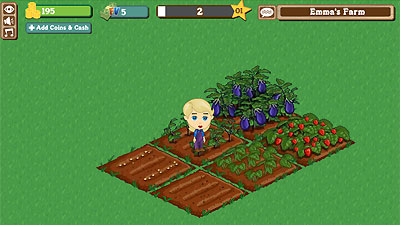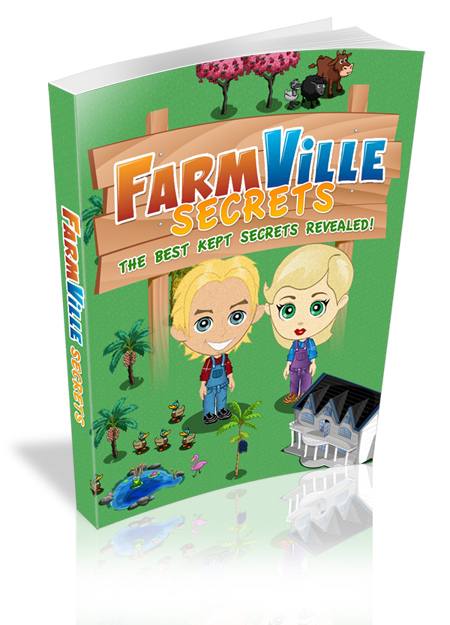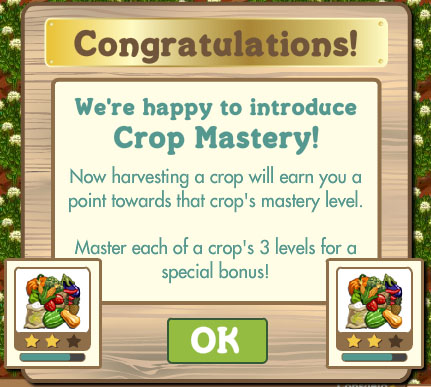I have a friend who’s in medical school. He sits in a classroom eight hours a day, five days a week. I noticed one day that he had a Farmville farm on Facebook. I hadn’t ever experimented with Farmville and asked him what it was all about. He showed me how it worked. I said, “So it’s pointless?” To which he responded, “Well, it’s a good way for me to kill time while I’m sitting in lecture all day.”
 Farmville is a game on the popular social networking site, Facebook. You “own” a plot of land on which you plant crops and raise ivestock. Eventually you can even buy tractors and build houses. My friend now has millions of coins, several houses on his virtual farm, and has even constructed an image of a Florida Gator logo out of different colored hay bales next to his virtual mansion.
Farmville is a game on the popular social networking site, Facebook. You “own” a plot of land on which you plant crops and raise ivestock. Eventually you can even buy tractors and build houses. My friend now has millions of coins, several houses on his virtual farm, and has even constructed an image of a Florida Gator logo out of different colored hay bales next to his virtual mansion.
After that ringing endorsement, I decided to try Farmville myself (I’m careful never to say I “play” Farmville, I just don’t think that’s the appropriate verb). After several weeks of virtual toil, I am now actually a fairly successful virtual farmer. In fact the Farmville coins are rolling in with such frequency now, that for the first time last night I noticed a lack of urgency in myself to plow and plant open plots.
 A lot of people are trying their hand at Farmville these days. According to one Time article, Farmville harvests 65 million “players” per month. How can a game so simple, and so lacking in difficulty or a need for strategy, be so popular? This has got to be the simplest, most mindless game I’ve ever come across, and still I found a strategy guide, when searching for images for this blog.
A lot of people are trying their hand at Farmville these days. According to one Time article, Farmville harvests 65 million “players” per month. How can a game so simple, and so lacking in difficulty or a need for strategy, be so popular? This has got to be the simplest, most mindless game I’ve ever come across, and still I found a strategy guide, when searching for images for this blog.
Apparently Farmville mastermind, and parent-company Zynga founder, Mark Pincus saw the promise in a mindless game formed around a social network. He learned valuable lessons in two failed startups before Zynga and now has a behavioral psychologist on staff. And here lies much of the secret to his success. Farmville, and Zynga’s countless other games like it, rely on the way humans behave to draw them in. They rely on the way humans like to be rewarded. That’s what’s scary about how popular, and how pointless, this game is.
People apparently love, or at least are intrigued by, a life of minimal challenge and maximum trivial reward. It doesn’t even matter how worthless the reward is in real terms, Farmville users will spend hours cultivating their computer screen to eventually bring them more homes and decorations that they can’t even view from more than one angle. And now the scariest part of all: this things makes money, lots of money. Based on projections in that same Time article, Zynga could be worth 1 billion dollars. Mark Pincus is a rich man. People spend money on this stuff.
Users get sucked in and decide they have to have the latest addition to the game. They need the newest farm decoration. The item is “priced” in such a way that you have to trade in real cash for virtual “Farmville bucks”. And they do it.
This is what a life without excitement leads to. Somehow we decide we can’t really do anything that special and we lower our expectations of what we can find here on earth. Before you know it we’re pouring our time and money into something of manufactured value, or even no value at all. What’s worse is when it happens outside of Farmville. It’s not only our virtual lives that are plotted around chasing the stuff of trivial value.
We spend our lives chasing the American Dream of a big house and a new Buick. We sock money away and ask the Lord to bless us through the stock market. Then we’re incredulous when he asks us to give Him ten percent because that really cuts into the capital for our virtual livestock.
It’s scary how popular Farmville has become. It’s even scarier how similar to real life it actually is. It’s scary how far we will go to chase things with no transcendent value.
Sometimes I look at the Farmville market and notice how many items require real cash. I get sad that people are spending real money on a game I use to kill time on commercial breaks. I think, “I’ll never end up doing that.” Of course I can’t be completely sure that will always be true until I stop checking my farm every day. And it just feels so darn rewarding.
 Farmville is a game on the popular social networking site, Facebook. You “own” a plot of land on which you plant crops and raise ivestock. Eventually you can even buy tractors and build houses. My friend now has millions of coins, several houses on his virtual farm, and has even constructed an image of a Florida Gator logo out of different colored hay bales next to his virtual mansion.
Farmville is a game on the popular social networking site, Facebook. You “own” a plot of land on which you plant crops and raise ivestock. Eventually you can even buy tractors and build houses. My friend now has millions of coins, several houses on his virtual farm, and has even constructed an image of a Florida Gator logo out of different colored hay bales next to his virtual mansion. A lot of people are trying their hand at Farmville these days. According to one Time article, Farmville harvests 65 million “players” per month. How can a game so simple, and so lacking in difficulty or a need for strategy, be so popular? This has got to be the simplest, most mindless game I’ve ever come across, and still I found a strategy guide, when searching for images for this blog.
A lot of people are trying their hand at Farmville these days. According to one Time article, Farmville harvests 65 million “players” per month. How can a game so simple, and so lacking in difficulty or a need for strategy, be so popular? This has got to be the simplest, most mindless game I’ve ever come across, and still I found a strategy guide, when searching for images for this blog.








